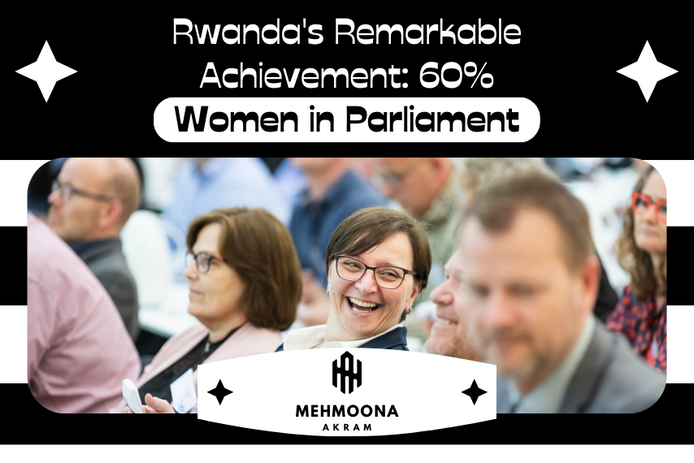
Introduction
In a world where gender equality remains a distant goal for many countries, Rwanda has emerged as a beacon of hope and progress. This East African nation has shattered the glass ceiling by achieving a historic milestone in its parliamentary representation – a remarkable 60% of women now hold seats in the Rwandan Parliament. This achievement not only speaks volumes about Rwanda’s commitment to gender equality but also serves as an inspiration to nations across the globe.
A Paradigm Shift
Rwanda’s journey towards gender parity in politics did not happen overnight. In fact, it is a testament to the country’s resilience and dedication to progress, even in the face of tremendous adversity. The transformation began after the Rwandan Genocide in 1994, a dark period that left the country devastated and grappling with the loss of nearly a million lives.
In the aftermath of this tragedy, Rwanda embarked on a path of healing and rebuilding. Central to this process was a commitment to ensuring that the voices and perspectives of women were not just heard but also actively incorporated into the nation’s decision-making processes.
Legal Frameworks and Quotas
One of the key catalysts for Rwanda’s rapid transformation was the implementation of progressive legal frameworks and quotas. In 2003, Rwanda introduced a groundbreaking law that required political parties to ensure that women occupied at least 30% of their parliamentary seats. This legal requirement was a significant step towards gender equality in politics, setting a clear precedent for the nation’s commitment to empowering women.
However, Rwanda did not stop at a 30% quota. Instead, the country went above and beyond, gradually increasing the quota until it reached the extraordinary milestone of 60% women in parliament. This commitment to women’s representation has been pivotal in reshaping the nation’s political landscape.
Empowering Women in Leadership
Rwanda’s success in achieving gender balance in parliament is not merely a statistical feat; it reflects a broader culture of women’s empowerment and leadership. The country has made significant investments in educating and training women for leadership roles. Initiatives such as the Rwanda Women’s Leadership Academy (RWLA) have provided women with the skills and confidence necessary to engage in politics effectively.
Additionally, Rwanda has encouraged women to participate in local governance, where they have gained invaluable experience and contributed to grassroots development. This bottom-up approach has created a pipeline of capable female leaders who are well-prepared to take on higher political responsibilities.
Benefits of Gender Parity
The benefits of Rwanda’s commitment to gender parity in parliament are profound and far-reaching. Firstly, it has allowed the nation to tap into a broader spectrum of perspectives and experiences, leading to more well-rounded and inclusive policymaking. Women in parliament have championed crucial issues such as healthcare, education, and gender-based violence, resulting in the implementation of progressive policies that directly benefit the population.
Moreover, Rwanda’s achievement has set a precedent for the African continent and the world. It sends a powerful message that gender equality is not only achievable but also essential for building prosperous and harmonious societies. The country has become a model for other nations to emulate and learn from.
Challenges and Future Aspirations
While Rwanda’s progress is commendable, it is not without its challenges. Gender-based violence and societal stereotypes continue to be obstacles to women’s full participation in political life. However, Rwanda’s unwavering commitment to gender equality shows that progress is possible even in the face of adversity.
Looking ahead, Rwanda’s achievement serves as a call to action for the international community. It highlights the urgency of breaking down barriers to women’s political participation worldwide and implementing policies and practices that empower women to take on leadership roles.
Conclusion
Rwanda’s remarkable achievement of having 60% of women in parliament is a testament to the nation’s unwavering commitment to gender equality. It is a story of resilience, dedication, and progressive policies that have reshaped the political landscape and empowered women to contribute significantly to the country’s development. Rwanda’s success serves as an inspiration to the world, demonstrating that gender parity is not a distant dream but a reality that can be achieved with determination and foresight. As the global community strives for greater gender equality, Rwanda stands as a shining example of what is possible when women’s voices are heard and valued in the corridors of power.



